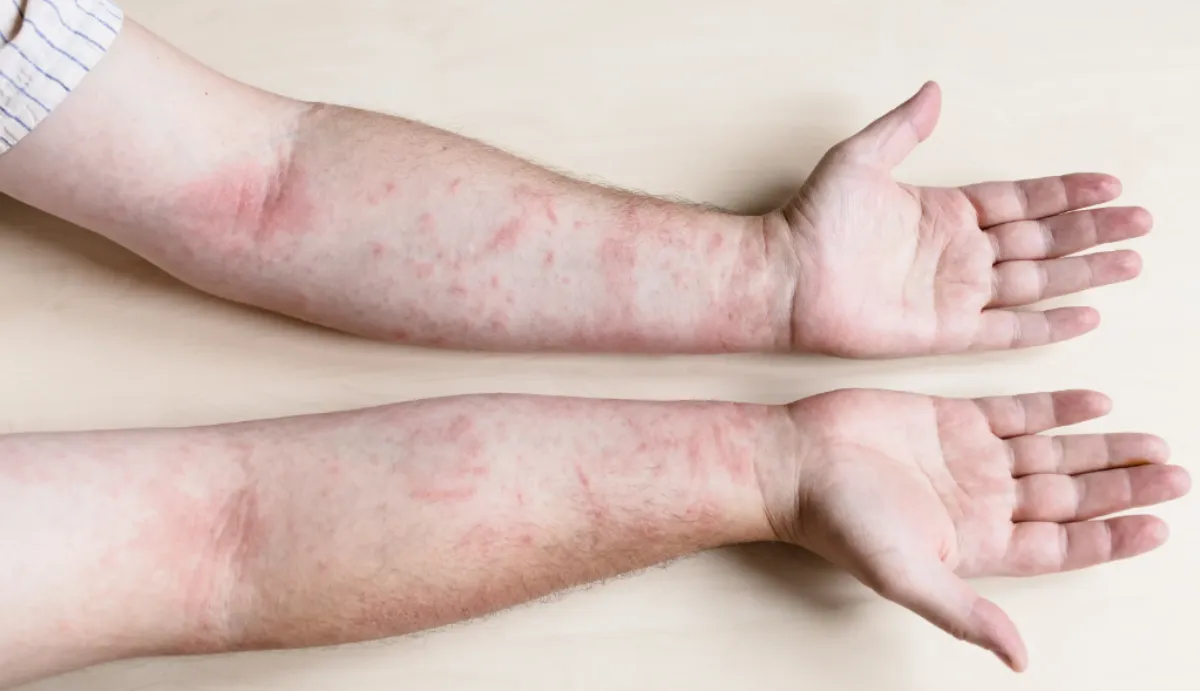Eczema is a long-term skin condition that causes dry, itchy, scaly, and sometimes painful skin. The most common type is called atopic dermatitis, but there are actually seven different types of eczema. Each type has its own symptoms and may need different treatments.
1. Atopic Dermatitis
Atopic dermatitis is the most common form of eczema. It often starts in childhood and may improve or go away by adulthood. However, some people may experience flare-ups later in life.
Symptoms:
- Itchy, dry skin
- Rashes on arms, elbows, knees, or face (in children)
- Scratching can lead to infections
Causes:
- Weak skin barrier
- Genetics, dry skin, immune system issues
- Triggers like stress, irritants, or allergens
2. Contact Dermatitis
This type of eczema happens when your skin reacts to something you touch. There are two kinds:
- Allergic contact dermatitis: Caused by an allergic reaction (e.g., latex or metal).
- Irritant contact dermatitis: Caused by direct damage to the skin (e.g., chemicals).
Symptoms:
- Itchy, red, or swollen skin
- Blisters or thickened skin
- Symptoms appear within 48 hours of contact
Causes:
- Common triggers: detergents, bleach, jewelry, soaps, or plants like poison ivy.
3. Dyshidrotic Eczema
This type causes small, itchy blisters on the hands and feet.
Symptoms:
- Fluid-filled blisters on fingers, toes, palms, or soles
- Pain, cracking, and flaking
Causes:
- Allergies, stress, damp skin, or exposure to metals like nickel.
4. Seborrheic Dermatitis
Often called scalp eczema, this type affects oily areas like the scalp, face, and upper back.
Symptoms:
- Scaly, oily patches
- Dandruff-like flakes
- In infants, it’s called cradle cap
Causes:
- Overgrowth of yeast on the skin
- Triggers: stress, illness, cold weather, or hormonal changes.
5. Neurodermatitis
This type causes thick, itchy patches of skin, often due to scratching.
Symptoms:
- Itchy, scaly patches on arms, legs, neck, or scalp
- Scratching makes it worse
Causes:
- Unknown, but stress or insect bites may trigger it.
6. Nummular Eczema
Also called discoid eczema, this type causes round, coin-shaped spots on the skin.
Symptoms:
- Red or pink (on lighter skin) or dark brown (on darker skin) spots
- Itchy, flaky, or cracked skin
Causes:
- Very dry skin or a history of other eczema types.
7. Stasis Dermatitis
This type is linked to poor blood flow, often in the legs.
Symptoms:
- Swelling, itching, or pain in the legs
- Varicose veins or open sores
Causes:
- Poor circulation, often due to weak veins.
When to See a Doctor
If your eczema symptoms don’t improve or interfere with your daily life, talk to a doctor. They can help diagnose your condition and recommend treatments.
Treatment Options
Treatment depends on the type and severity of eczema. Options include:
- Over-the-counter creams: Moisturizers or antihistamines
- Prescription medications: Steroid creams or biologics
- Lifestyle changes: Avoiding triggers, managing stress
- Home remedies: Oatmeal baths or wet wrap therapy
FAQs
What are the 7 types of eczema?
Atopic dermatitis, contact dermatitis, dyshidrotic eczema, seborrheic dermatitis, neurodermatitis, nummular eczema, and stasis dermatitis.
What triggers eczema?
Triggers include stress, irritants, allergens, dry skin, and certain foods or medications.
Key Takeaways
Eczema is a group of skin conditions that cause itchy, dry, and inflamed skin. While there’s no cure, treatments can help manage symptoms. If your eczema doesn’t improve, see a doctor for a personalized treatment plan.

